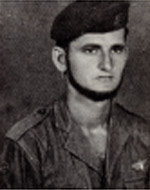Mintz, Shmuel
Son of Shalom and Rebecca. He was born on the 14th of Sivan 5636 (June 14, 1936) in the city of Mezrit, Poland. As a child, the Second World War broke out and the Germans entered his native city of Warsaw and many Jews were put to the gallows; His father was also executed on the streets and these shocking memories left their mark on the child’s life. Throughout the war years, the mother and her son wandered across the Soviet Union and suffered from cold, starvation, and deprivation. At the end of the war, the mother and her son were taken to the German city of Lignitz (which was attached to Poland), where a large community of Jews tried to rebuild their lives because their old house had been destroyed. There, Shmuel began to study at the school, but he soon had the desire to study in a Jewish school. In particular, he decided to stop his studies at the Polish school because he had heard of children immigrating to Israel. After a while Shmuel entered the Hebrew school, but soon this school was closed by the authorities and the boy escaped to a training kibbutz of Hashomer Hatzair. In 1950 he immigrated to Israel together with his mother (during the great immigration of Polish Jews at the time), and the boy arrived at the youth company in Ruhama. He was gifted and when he woke up in my social life, his words were heard attentively. Discovered talent-acting on stage and even in the sports field. He was eager to become the locksmith. He showed cleverness and wisdom in all his actions and words. He spent six years in Ruhama, and when he reached draft age, in October 1954, he appeared in the agriculture wearing the wings of a parachutist. Before the IDF action on the Qalqiliya police, he was in an officer’s course, leaving the camp and rushing to the scene, but he arrived late, while the course commanders regretted losing an outstanding cadet like him, but because of discipline they had to remove him from the course. He volunteered for Sayeret, the military unit whose mission was to act on the first line, and was Simcha when he learned that he had been accepted into this unit, but he had not yet learned his new position. 1956) was killed in a battle in the Mitla Pass in the Sinai system and was buried in the Military Cemetery at the time of the emergency in Beshalach On the 11th of Marcheshvan 5707 (November 6, 1957) Land-rest at the military cemetery in Kiryat Shaul. Remember Tevet Tsi”z raised booklet of “pages” (information from the Immigration Department for Children and Youth, published by the Jewish Agency in Jerusalem). Kibbutz Ruhama also published a booklet in his memory bearing his name. In Uri Milstein’s book “Wars of the Paratroopers,” his memory was raised.
